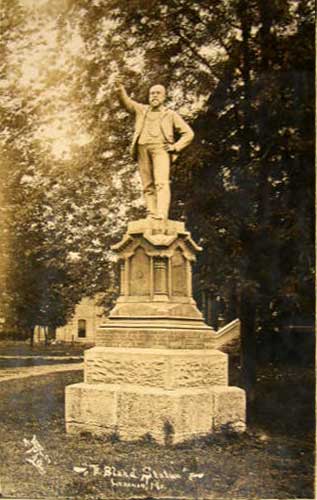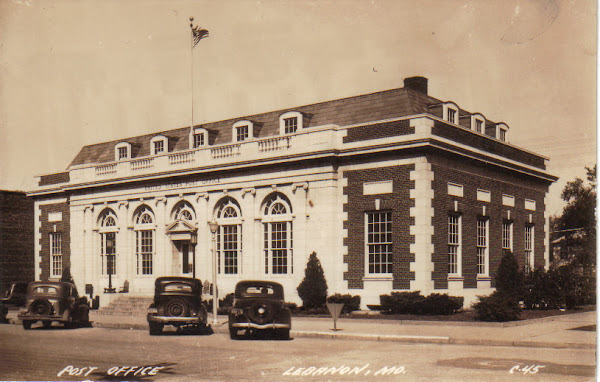Elsewhere on this page I am posting today's column by Sarah Overstreet, a feature writer for Springfield News-Leader. I thought it was WONDERFUL and very much worth passing on to those of you who don't have the privilege of reading her stuff.
Sarah and I are an interesting story in ourselves which has a good point to make. Sarah has been writing for the News-Leader for a long time, certainly since before 1983. I know, because that's the year they hired me to write a weekly column for their editorial page wherein I was supposed to show my conservative social issue and political points of view in such a controversial way so as to garner more readership for their newspaper.
Those of you who know me will recognize that this was right down my "opinionated outspoken alley". Back in those days people could have their letters to the editor printed anonymously, so while my name and picture appeared each week with my philosophizing, people could come at me from all sides with their criticisms and I never knew who they were.
Sarah, on the other hand, could find fault with my writings, and did in her writings, but had to sign her name. So over the course of 9 years our picking at each other went on quite frequently, but we didn't know each other, had never laid eyes on each other.
I quit writing in 1992 because I was antagonizing my insurance clients who disagreed with me, and I needed their commissions more than the monthly small stipend the newspaper was paying for me to generate letters to the editor. Sarah, meanwhile, continued to write.
Then last year, when I took up the cause for Dr. Ramona Miller, I found out Sarah was working on her cause, too, and as fate would have it, Sarah and I met at the Laclede County jail one day while both of us were there to visit Dr. Miller.
We took to each other immediately, and have become good friends, even finding out we have much more in common than we ever had in diversity, and I just love her and admire her so much. And the moral of this story is....if everyone could really get to know each other, we might fight less and actually expend our energies working for good instead of using it against each other.
Now, if you have read this far, please read very carefully her column I have posted. And then read the veterans' tribute which she had printed along with her column. It is SO beautiful and moving.
Wednesday, July 4, 2007
Subscribe to:
Post Comments (Atom)
Current discussion on "Banishment during Civil War"
RE: [ourhistory] Banishment during the Civil War
Ann,
My gg-grandfather Ephraim Davis who was 33-36 at the time removed his family including my g-grandfather Alonzo (3 yrs old) and Harve (5 yrs old) to Illinois during the Civil War and returned afterwards. It is said he did this to protect his family, but on the return trip his wife and newly born daughter died and are buried near Rolla
I Googled ‘Banishment during the US Civil War” and found a couple of interesting notes on banishment
Note 1
Banishment to the South was a favored Yankee method of dealing with Southern sympathizers in their midst, though being a sympathizer did not necessarily mean being a spy. Many women were forced into exile under the threat of more severe punishment for offenses ranging from publicly denouncing an occupying army to actually giving information to the enemy. When Henrietta Barr's sister, Sarah Cotton, was arrested, Barr wrote in her diary:
"After 12 o'clock at night, Friday the 17th, Sarah was arrested and taken over the lines without a word of a trial. She was torn from her little children and threatened if she dared return that she would be `shot as a spy.' Comment is unnecessary."
Note 2
In response to widespread criticism of his suspension of the writ of habeas corpus and the banishment of Vallandigham, Lincoln wrote a long letter to Democratic Party leaders defending his actions. Lincoln declared that the regular civilian courts were inadequate during a rebellion. He claimed that those opposing the Unions cause endangered "the public safety." Ordinarily, he wrote, such people could not be arrested since criticizing the government was not a criminal offense. If such persons were arrested, they would undoubtedly be released on a writ of habeas corpus by a civilian court judge. The necessary solution, Lincoln argued, was to suspend the writ and lock up the troublemakers until the war ended.
As for Vallandigham, Lincoln charged that he was encouraging desertions from the Union army. "Must I shoot a simpleminded soldier boy who deserts," Lincoln asked, "while I must not touch a hair of a wily agitator who induces him to desert?"
After Vallandigham was banished to the South, his friends went to the U.S. Supreme Court in an attempt to convince the justices to hear the case. On February 15, 1864, the Supreme Court announced it would refuse to hear the case, saying that it had no authority to review the proceedings of a martial law court. While the bloody Civil War raged on, the Supreme Court decided it was not the time to challenge the power of General Burnside or his commander-in-chief, Abraham Lincoln.
Note 3
Rowland Family, Papers, 1844-1893, (C2244)1 folder(s)Includes letters from Robert A. Rowland to his wife Olive in Howard County, MO, while he was enroute (1849) and in California (1850) and during his imprisonment and banishment to Illinois during the Civil War. Also includes miscellaneous letters from other family members and newspaper article describing death of and memorial services for I.N. Rowland (1893).
Bill Henry
Ann,
My gg-grandfather Ephraim Davis who was 33-36 at the time removed his family including my g-grandfather Alonzo (3 yrs old) and Harve (5 yrs old) to Illinois during the Civil War and returned afterwards. It is said he did this to protect his family, but on the return trip his wife and newly born daughter died and are buried near Rolla
I Googled ‘Banishment during the US Civil War” and found a couple of interesting notes on banishment
Note 1
Banishment to the South was a favored Yankee method of dealing with Southern sympathizers in their midst, though being a sympathizer did not necessarily mean being a spy. Many women were forced into exile under the threat of more severe punishment for offenses ranging from publicly denouncing an occupying army to actually giving information to the enemy. When Henrietta Barr's sister, Sarah Cotton, was arrested, Barr wrote in her diary:
"After 12 o'clock at night, Friday the 17th, Sarah was arrested and taken over the lines without a word of a trial. She was torn from her little children and threatened if she dared return that she would be `shot as a spy.' Comment is unnecessary."
Note 2
In response to widespread criticism of his suspension of the writ of habeas corpus and the banishment of Vallandigham, Lincoln wrote a long letter to Democratic Party leaders defending his actions. Lincoln declared that the regular civilian courts were inadequate during a rebellion. He claimed that those opposing the Unions cause endangered "the public safety." Ordinarily, he wrote, such people could not be arrested since criticizing the government was not a criminal offense. If such persons were arrested, they would undoubtedly be released on a writ of habeas corpus by a civilian court judge. The necessary solution, Lincoln argued, was to suspend the writ and lock up the troublemakers until the war ended.
As for Vallandigham, Lincoln charged that he was encouraging desertions from the Union army. "Must I shoot a simpleminded soldier boy who deserts," Lincoln asked, "while I must not touch a hair of a wily agitator who induces him to desert?"
After Vallandigham was banished to the South, his friends went to the U.S. Supreme Court in an attempt to convince the justices to hear the case. On February 15, 1864, the Supreme Court announced it would refuse to hear the case, saying that it had no authority to review the proceedings of a martial law court. While the bloody Civil War raged on, the Supreme Court decided it was not the time to challenge the power of General Burnside or his commander-in-chief, Abraham Lincoln.
Note 3
Rowland Family, Papers, 1844-1893, (C2244)1 folder(s)Includes letters from Robert A. Rowland to his wife Olive in Howard County, MO, while he was enroute (1849) and in California (1850) and during his imprisonment and banishment to Illinois during the Civil War. Also includes miscellaneous letters from other family members and newspaper article describing death of and memorial services for I.N. Rowland (1893).
Bill Henry
Bennett Spring Hotel








.jpg)











.jpg)


No comments:
Post a Comment